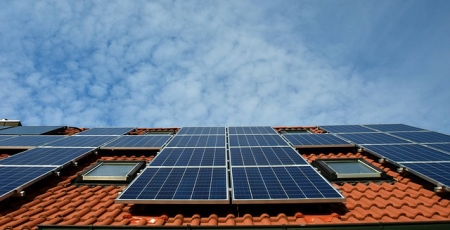VAT hike puts brakes on home solar and batteries

|
On Monday June 24, less than two weeks after outgoing Prime Minster Theresa May declared that the UK will achieve its new ‘Net Zero Carbon’ goal by 2050, a jubilant renewable energy industry was quickly pulled back down to earth. HMRC announced that, from October 1, 2019, VAT on home solar PV and solar-battery systems will increase sharply from 5% to 20%.
The PM’s net zero announcement positioned the UK as a world leader in the fight against climate change. This latest move, however, somewhat contradicts that commitment. It could also further destabilise the UK’s renewable energy industry, which was left wounded by the recent removal of the Feed-in Tariff.
Our net zero commitment still stands, of course, and it is still expected to herald more de-centralised renewable energy installations and accelerate the electrification of infrastructure, but the transition to a carbon-free future will be hampered by this VAT hike.
The labour component of solar and battery installations – the cheapest part – will remain taxed at 5%. The new rate will apply to material costs, which in general are the most expensive part of an installation. This will most likely have a negative effect on a key part of the energy mix needed to balance the grid and enable more ‘self-consumption’ by members of the public. Meanwhile (and worryingly for our net zero target), VAT rates for home gas and coal supplies will remain at 5%.
It is disappointing that, despite clear and definitive guidance from the Committee on Climate Change, and overwhelming consensus in the scientific community (and in the general population), the government still went ahead with this decision.
The official rationale is that, according to EU law ruled in 2015, the discounted tax rate was illegal to begin with. However, the government did not enact any changes to the VAT rate at the time, and the European Court of Justice has since published a VAT action plan (2016) without comment on solar power. It is perhaps telling that the new rates are due to come into effect the same month that the UK is to leave the EU.
ECA will continue to encourage government to make it clear how it intends to support industry in making the shift to a carbon-free future, and will continue to recommend actions that work for the benefit of both business and the environment.
[edit] About this article
This article was written by Luke Osborne, ECA Energy and Emerging Technologies Solutions Advisor. It was previously published on the website of the ECA in June 2019 and can be accessed here.
[edit] Related articles on Designing Buildings Wiki
- Battery energy storage systems with grid-connected solar photovoltaics BR 514.
- BRE National Solar Centre.
- BRE photovoltaic certification scheme.
- Code of practice for grid connected solar photovoltaic systems.
- Future of electricity in domestic buildings.
- Installation of photovoltaic panels on existing flat roofs - some lessons learned IP 8 14.
- Large scale solar thermal energy.
- Microgeneration.
- Micro-grid.
- Renewable energy sources: how they work and what they deliver: Part 4: Solar thermal hot water systems DG 532 4.
- Solar Squared.
- Solar thermal systems.
- Tau - the solar powered island.
- Wind loads on roof-mounted photovoltaic and solar thermal systems DG 489.
--ECA
Featured articles and news
Homes England creates largest housing-led site in the North
Successful, 34 hectare land acquisition with the residential allocation now completed.
Scottish apprenticeship training proposals
General support although better accountability and transparency is sought.
The history of building regulations
A story of belated action in response to crisis.
Moisture, fire safety and emerging trends in living walls
How wet is your wall?
Current policy explained and newly published consultation by the UK and Welsh Governments.
British architecture 1919–39. Book review.
Conservation of listed prefabs in Moseley.
Energy industry calls for urgent reform.
Heritage staff wellbeing at work survey.
A five minute introduction.
50th Golden anniversary ECA Edmundson apprentice award
Showcasing the very best electrotechnical and engineering services for half a century.
Welsh government consults on HRBs and reg changes
Seeking feedback on a new regulatory regime and a broad range of issues.
CIOB Client Guide (2nd edition) March 2025
Free download covering statutory dutyholder roles under the Building Safety Act and much more.
Minister quizzed, as responsibility transfers to MHCLG and BSR publishes new building control guidance.
UK environmental regulations reform 2025
Amid wider new approaches to ensure regulators and regulation support growth.
BSRIA Statutory Compliance Inspection Checklist
BG80/2025 now significantly updated to include requirements related to important changes in legislation.























